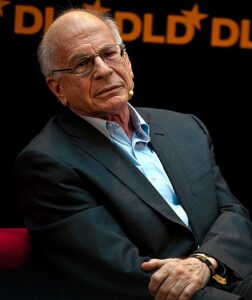

This work by NRKbeta.no is licensed under a Creative Commons Attribution-Share Alike 3.0 Norway License.
Permissions beyond the scope of this license may be available at http://nrkbeta.no/cc/.
Daniel Kahneman, co-winner of the 2002 Nobel Prize in economics, along with Vernon Smith, died today. Here’s his obit in the Washington Post.
Here’s his bio in the Concise Encyclopedia of Economics.
Here’s an excerpt from the bio:
One bias they [Kahneman and Tversky] found is that people tend to believe in “the law of small numbers”; that is, they tend to generalize from small amounts of data. So, for example, if a mutual fund manager has had three above-average years in a row, many people will conclude that the fund manager is better than average, even though this conclusion does not follow from such a small amount of data. Or if the first four tosses of a coin give, say, three heads, many people will believe that the next toss is likely to be tails. Kahneman saw this belief in his own behavior as a young military psychologist in the Israeli army. Tasked with evaluating candidates for officer training, he concluded that a candidate who performed well on the battlefield or in training would be as good a leader later as he showed himself to be during the observation period. As Kahneman explained in his Nobel lecture, “As I understood clearly only when I taught statistics some years later, the idea that predictions should be less extreme than the information on which they are based is deeply counterintuitive.”
Here’s my favorite excerpt from the WaPo obit:
During World War II, he was forced to wear a Star of David after Nazi German forces occupied the city in 1940. One night in 1941 or ’42, he later recalled, he stayed out past the German-imposed curfew for Jews while visiting a friend, and he turned his sweater inside out to hide the star while he walked a few blocks home. He then crossed paths with a soldier in the SS, who called him over, picked him up — and hugged him.
“I was terrified that he would notice the star inside my sweater,” Dr. Kahneman noted in a biographical essay for the Nobel Prize ceremonies. But the German pulled out his wallet, showed him a photo of a boy, gave him some money and sent him on his way. “I went home more certain than ever that my mother was right: people were endlessly complicated and interesting.”
My favorite work of his is Thinking, Fast and Slow. I read about half of it on a flight from San Francisco to Seoul just after it came out and was so excited about his distinction between System 1 (fast) and System 2 (slow) thinking that I wanted to share it with my seat mates. Unfortunately, they didn’t speak English. I figured out that from a very early age I’ve been mainly a System 2 thinker. After having honed the skill for decades, though, I do it fairly fast.
Here’s former co-blogger Bryan Caplan’s Eureka moment where he uses a Kahneman insight to explain why people often go wrong in thinking about economics and economic policy.

READER COMMENTS
Jim Glass
Mar 28 2024 at 12:41am
RIP. One of my heroes in economics – and he wasn’t even an economist.
Comments are closed.